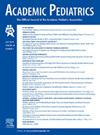Anti-Asian American, Native Hawaiian, and Pacific Islander Racism in Academic Pediatrics: Recommendations for Training, Research, and Clinical Practice
IF 3
3区 医学
Q1 PEDIATRICS
引用次数: 0
Abstract
This paper discusses how anti-Asian American, Native Hawaiian, and Pacific Islander (AANHPI) racism affects pediatric training, research, and clinical practice. Extant research shows that racism and discrimination are social determinants of health that impact AANHPI populations, including youth. AANHPI youth face significant health disparities and a wide range of barriers to health care access. However, AANHPIs tend to be seen by clinicians and depicted in training as monolithic, high achieving, and a relatively low priority in terms of pediatric workforce recruitment and training and pediatric research. After a brief discussion of US policies that have explicitly aimed to exclude, punish, or imprison AANHPIs, the paper explains AANHPI racism and its consequences. The paper then describes evidence of anti-AANHPI racism in pediatrics and offers recommendations for training, research, and clinical practice.
学术儿科中的反美籍亚裔、夏威夷原住民和太平洋岛民种族主义:培训、研究和临床实践建议》(Recommendations for Training, Research, and Clinical Practice)。
本文讨论了反亚裔美国人、夏威夷原住民和太平洋岛民(AANHPI)种族主义如何影响儿科培训、研究和临床实践。现有研究表明,种族主义和歧视是影响包括青少年在内的亚裔美国人、夏威夷原住民和太平洋岛民健康的社会决定因素。亚非裔美国人和太平洋岛国青年在健康方面面临着巨大的差异,在获得医疗保健服务方面也面临着广泛的障碍。然而,在临床医生和培训人员的眼中,亚裔美国人、加拿大人和太平洋岛国人往往是单一的、成绩优异的,在儿科人才招聘、培训和儿科研究方面的优先级相对较低。在简要讨论了美国明确旨在排斥、惩罚或监禁亚非裔美国人的政策后,本文解释了亚非裔美国人种族主义及其后果。然后,本文描述了儿科中反亚裔美国人和加拿大人种族主义的证据,并对培训、研究和临床实践提出了建议。
本文章由计算机程序翻译,如有差异,请以英文原文为准。
求助全文
约1分钟内获得全文
求助全文
来源期刊

Academic Pediatrics
PEDIATRICS-
CiteScore
4.60
自引率
12.90%
发文量
300
审稿时长
60 days
期刊介绍:
Academic Pediatrics, the official journal of the Academic Pediatric Association, is a peer-reviewed publication whose purpose is to strengthen the research and educational base of academic general pediatrics. The journal provides leadership in pediatric education, research, patient care and advocacy. Content areas include pediatric education, emergency medicine, injury, abuse, behavioral pediatrics, holistic medicine, child health services and health policy,and the environment. The journal provides an active forum for the presentation of pediatric educational research in diverse settings, involving medical students, residents, fellows, and practicing professionals. The journal also emphasizes important research relating to the quality of child health care, health care policy, and the organization of child health services. It also includes systematic reviews of primary care interventions and important methodologic papers to aid research in child health and education.
 求助内容:
求助内容: 应助结果提醒方式:
应助结果提醒方式:


